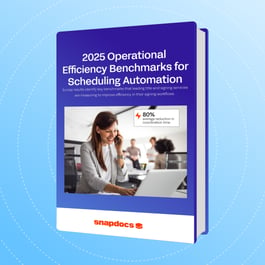Mortgage advisory firm, STRATMOR Group, recently set out to answer the following question: how much time do lenders spend producing a single loan? To answer this question, STRATMOR Group surveyed over 150 mortgage lenders and found that the average lender spends more than 70 days per loan. But does loan production speed matter? And if so, why?
In this article, senior executives from Legacy Mutual Mortgage, STRATMOR Group, and Snapdocs explore why loan production speed is so important—and how that speed influences productivity, operations, revenue, and customer experience. To read a deep dive into STRATMOR’s research, see the full industry report.
A shorter mortgage timeline reduces the risk of critical issues
The mortgage process is inherently complex, with a lot of moving parts and stakeholders. The longer a loan is in production, the higher the chance of something going wrong.
“If you compare the loan process to surgery, it’s dangerous to keep the patient open for too long because of the risk of complications. As long as a loan is floating around, you can have issues. The consumer might find a better deal and cancel, lose their job, or go on a shopping spree and change their credit profile. The faster you can close loans, the better off you are overall.”
—Garth Graham, Senior Partner - STRATMOR Group
However, faster loan processing isn’t just about speed–it’s also about efficiency and accuracy. Technology helps lenders catch and fix errors early, long before they lead to issues that could delay or derail the loan entirely. The ability to use automation to identify errors also means closing teams can spend less time manually checking documents.
“AI-enabled quality control catches errors early, so they can be fixed before the closing appointment. It's a proactive approach that ensures the closing date is maintained, and the process continues smoothly.”
—Todd Maki, Vice President of Customer Success, Snapdocs
Time is money, and even more so in the mortgage industry
Many lenders focus on the front-end process, but what happens after the closing can have a big impact on a lender’s bottom line. Post-closing speed is essential for profitability; missing documents, filing errors, or human mistakes can be costly—in time and money. By automating tasks, lenders can save time on every loan, preventing hold-ups that eat into profits, and converting loans into revenue faster.
"Snapdocs’ automation sends funding documents to our LOS, eliminating the need to open each file manually, date the PDF, upload the PDF, and review the documents. We can fund and ship loans much faster—and focus on more important tasks.”
—Raven Johnson, VP of Business Systems, Legacy Mutual Mortgage
Similarly, for lenders who sell loans on the secondary market, post-closing efficiency is even more critical. Every day that passes without delivering a loan to an investor can be costly.
“Everyone’s high-fiving at the closing table, but the lender has only incurred more expense without generating any immediate profit. The real cash flow occurs after the closing when the loan is sold to an investor, so post-closing loan production speed is a crucial element.”
—Garth Graham, Senior Partner, STRATMOR Group
Faster closings make borrowers happier
Every day counts in the borrower’s homebuying experience. When lenders eliminate errors and speed up the loan process, it’s not just about operational efficiency—they’re building a reputation for exceptional customer service. It’s also a good way to create repeat customers and generate referral business.
“The signing event is the customer's last experience with us. It can make or break their satisfaction with the entire process, and we want to give them a positive lasting impression."
—Raven Johnson, VP of Business Systems, Legacy Mutual Mortgage
Ultimately, speed matters in improving efficiency, cost savings, and overall borrower experience. Snapdocs lenders have remarkably fast loan velocity—averaging loan production timelines nearly 20 days faster than industry average. To learn more about how Snapdocs is helping lenders digitize the closing process, chat with a member of our team.



















